










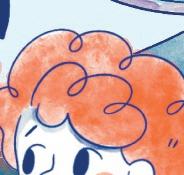



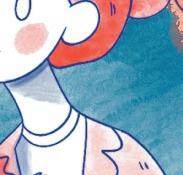
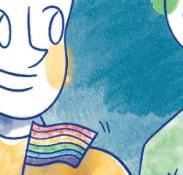
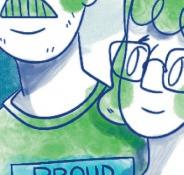
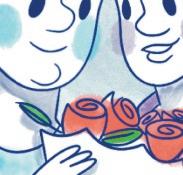

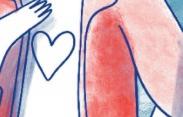
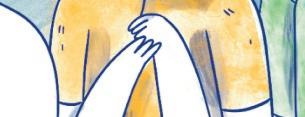
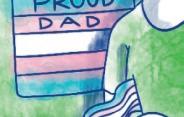













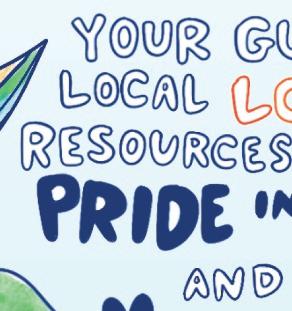
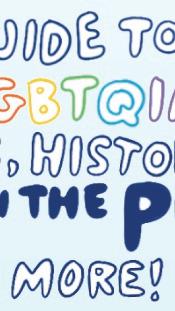





















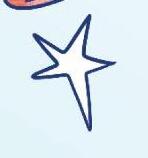
26th Annual Pride in the Pines


















Pride in the Pines is the largest Pride Celebration in Nor ther n Arizona! Without the help of our amazing sponsors, none of our goals would be achieved. We thank ever yone for their contribution and dedication to our organization, Flagstaff Pride.










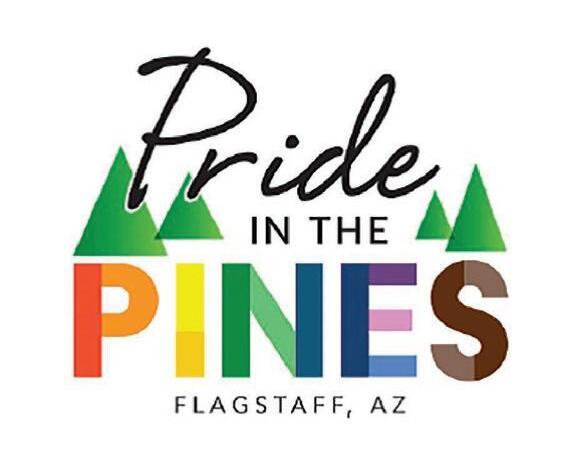
2 | JUNE 2022 PRIDE ASSOCIATION
Pride in the Pines • Saturday, June 18th • Thorpe Park Ball Fields

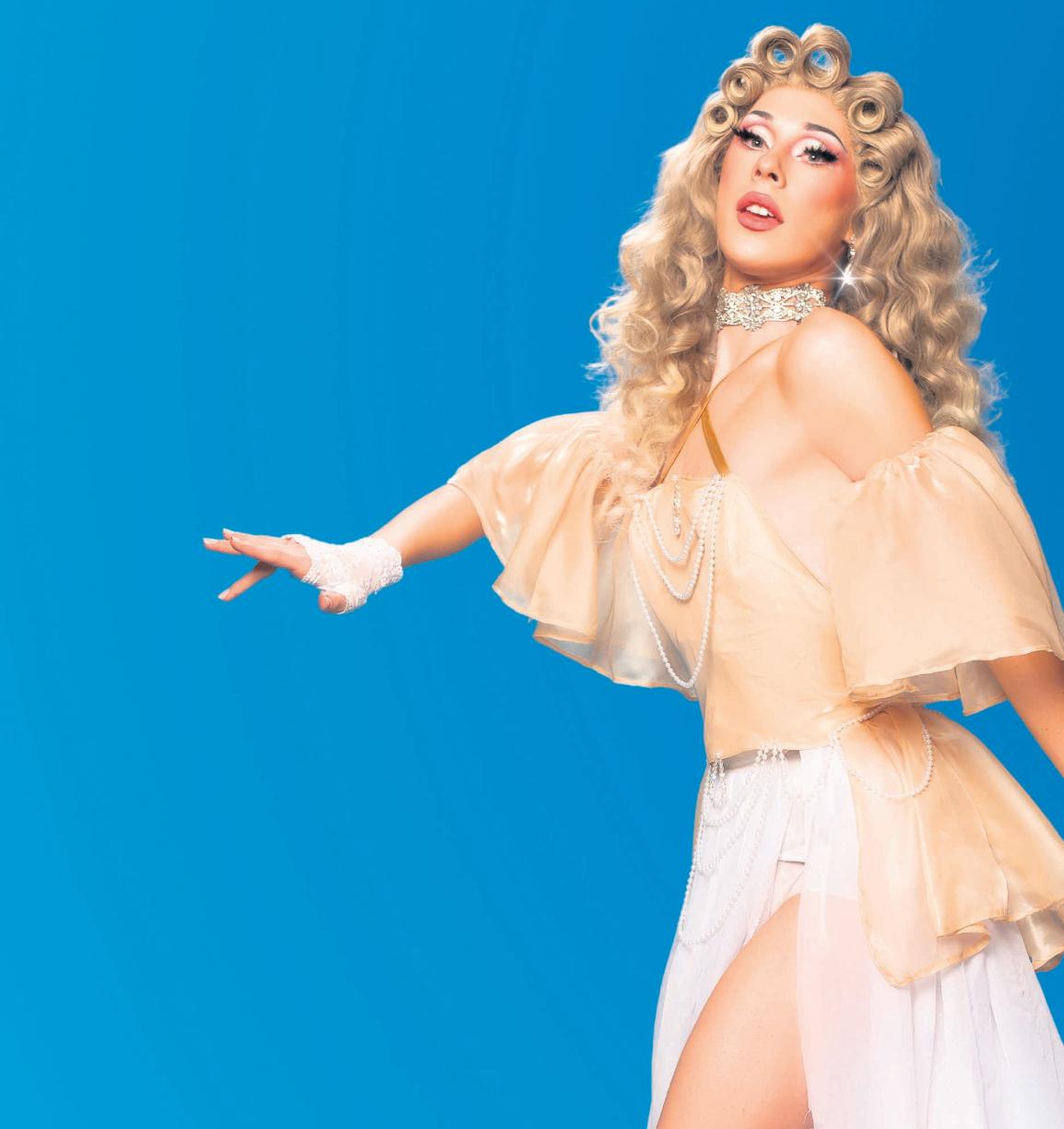







Special Section 1 Sunday, June 5, 2022 | 3 DO IT FOR YOUR SELF I do it for peace of mind. - Chris Mort Scan the QR code or visit GetTestedAZ.org to request your free HIV test
Welcome to Pride 2022
‘Pride is not something that is a week or a month, it is every day and we should celebrate it no matter what.”


These are the words of performer, Sister of Perpetual Indulgence and Two-Spirit activist Navi Ho, who is featured in this special Pride 2022 publication. What better way to start o the month’s festivities, and this Northern Arizona Pride Association-sponsored publication than with a quote that reminds us to celebrate our fellow queer, trans, nonbinary, LGBTQIA+ loved ones, friends and colleagues every single day.
This year, Pride in the Pines will take place at the Thorpe Park ball fields June 18 from 12-9 p.m. with an after-party at the Orpheum Theater. Hosted by Espressa Grande and Kim Etiquette, the event will feature drag shows, dancing, music by Latin Grammy nominated artist Gina Chavez, educational programming and more. Recently having celebrated its 25th anniversary, Pride in the Pines has seen di erent venues over the years, including Wheeler Park, where it moved in 2004 and stayed for about 10 years, as well as Fort
Tuthill County Park, which saw Flagsta ’s first Pride—a gathering of about 200 people—in 1996. As the festival’s visitorship has grown, so too has the range of services Pride is able to o er. This includes booths of several nonprofits and health care providers that work to support the LGBTQIA+ community. Finally, more than 50 years have passed since the three-day riots against police violence at Stonewall Inn in New York City–in many ways the catalyst for Pride celebrations around the world today. Thank you Sylvia Rivera and Marsha P. Johnson. At its core, Pride is centered on the rights and resistance of gay, nonbinary, queer, gender-nonconforming, transgender (and so many more) people, something that would not exist without Stonewall and the trans women who lead the way. So, as you flip through the pages of this booklet, remember all those who have paved the way. Then, head over to Pride in the Pines June 18 to celebrate and get educated!
We hope you use this publication as a guide, after all, there is a lot to learn inside.

Thanks for reading!
 Svea Conrad, Niche Editor
Svea Conrad, Niche Editor


P.S. To buy tickets or learn more, visit www.flagsta pride.org/pride-in-the-pines/
PRIDE OFFERING TESTING
ABIGAIL KESSLER
Arizona Daily Sun

Coconino County Health and Human Services (CCHHS) and North Country Healthcare (NCHC) will be partnering to offer free rapid human immunodeficiency virus (HIV) testing at the upcoming Pride in the Pines celebration. Rapid HIV testing will be available on Saturday, June 18 from 12 to 5 p.m.
As of 2019, a total of 17,330 Arizona residents over age 13 had been diagnosed with HIV. The Centers for Disease Control (CDC) estimates that 1,189,700 people across the United States had HIV by the end of 2019, about 87% of whom had been diagnosed.

“The only way to know for sure whether you have HIV is to get tested,” according to the CDC. It recommends everyone between the ages of 13 and 64 be tested at least once. Those with higher risk factors should be tested at least once a year.
Organizations in Coconino County that o er HIV and other


STD testing year-round include Planned Parenthood, Native Americans for Community Action (NACA), NCHC and CCHHS. A full list of locations can be found at gettested.cdc.gov.
CCHHS o ers STI testing, which includes HIV testing, at its Health and Wellness Clinic (2625 N. King St), as well as pre-exposure prophylaxis (PrEP).
This program “does not require paperwork or insurance for charting or patient records” and services through the Health and Wellness Clinic are available on a sliding scale fee. More about the clinic can be found at coconino.az.gov/1976/ Health-and-Wellness-Clinic or by calling 928-679-722.
NCHC also o ers HIV prevention, testing and education services. These include care clinics, screening, prevention classes and several aid programs. More information is available at north countryhealthcare.org/commu nity-programs/hivaids-treat ment-and-services or by calling 928-522-9454.
4 JUNE 2022 PRIDE 2022
323 N Leroux, Suite B www.aspenmedcenter.com (928) 213-5828
Dr.
Inspired Naturopathic Care in Flagstaff, AZ Most Experienced Naturopathic Physicians in Flagstaff
Dr. Dan Rubin
Amber Belt
WORDS MATTER
Terms, pronouns and vocabulary to add to your everyday dictionary
Treating people with respect means understanding and applying proper terminology and use of pronouns. The following list was compiled using resources from Illinois Wesleyan University’s LGBTQ+ 101 list. The list has been shortened to fit print margins. For a full version, visit www. iwu.edu/gender-sexuality/101.html.
Agender
Adj. : a person who sees themselves as existing without gender. Sometimes called gender neutrois, gender neutral, or genderless.
Ally
A (typically straight and/or cisgender) person who supports and respects members of the LGBTQ community.
Bicurious
A curiosity toward experiencing attraction to people of the same gender/sex.
Bigender

A person who fluctuates between traditionally “woman” and “man” gender-based behavior and identities, identifying with two genders (or sometimes identifying with either man or woman, as well as a third, di erent gender).
Bisexual
A person who experiences attraction to some men and women. 2 adj. : a person who experiences attraction to some people of their gender and another gender. Bisexual attraction does not have to be equally split, or indicate a level of interest that is the same across the genders an individual may be attracted to. Often used interchangeably with “pansexual”.
Cisgender
A gender description for when someone’s sex assigned at birth and gender identity correspond in the expected way (e.g., someone who was assigned male at birth, and identifies as a man). The word cisgender can also be shortened to “cis.”
Cisnormativity
The assumption, in individuals and in institutions, that everyone is cisgender, and that cisgender identities are superior to trans identities and people. Leads to invisibility of non-cisgender identities.
Dead name
The name given at birth/legal name of someone who has since changed their name or goes by a di erent name.




Feminine-presenting; masculine-presenting
A way to describe someone who expresses gender in a more feminine/masculine way. Often confused with feminine-of-center/masculine-of-center, which generally include a focus on identity as well as expression.
Femme
Someone who identifies themselves as feminine, whether it be physically, mentally or emotionally. Often used to refer to a feminine-presenting queer woman or people.
Fluid(ity)

Generally with another term attached, like “gender fluid” or fluid sexuality, fluid(ity) describes an identity that may change or shift over time between or within various identities.
Gender binary
The idea that there are only two genders and that every person is one of those two.
Gender expression
The external display of one’s gender, through a combination of clothing, grooming, demeanor, social behavior and other factors, generally made sense of on scales of masculinity and femininity. Also referred to as “gender presentation.”
Gender identity
The internal perception of an one’s gender, and how they label themselves, based on how much they align or don’t align with what they understand their options for gender to be. Often conflated with biological sex, or sex assigned at birth.
Gender non-conforming
A gender descriptor that indicates a non-traditional gender expression or identity (e.g., “masculine woman”). 2 adj. : a gender identity label that indicates a person who identifies outside of the gender binary. Often abbreviated as “GNC.”
Genderqueer
1 adj. : a gender identity label often used by people who do not identify with the binary of man/woman. 2 adj. : an umbrella term for many gender non-conforming or non-binary identities (e.g., agender, bigender, genderfluid).
Heteronormativity
The assumption, in individuals and/or in institutions, that everyone is heterosexual and that heterosexuality is superior to all other sexualities. Leads to invisibility and stigmatizing of other sexualities: when learning a woman is married, asking her what her husband’s name is. Heteronormativity also leads us to assume that only masculine men and feminine women are straight.
Heterosexism
Behavior that grants preferential treatment to heterosexual people, reinforces the idea that heterosexuality is somehow better or more “right” than queerness, and/or makes other sexualities invisible.
Outing
verb : involuntary or unwanted disclosure of another person’s sexual orientation, gender identity, or intersex status.
Pansexual
A person who experiences sexual, romantic, physical and/or spiritual attraction for members of all gender identities/expressions. Often shortened to “pan.”
PGPs
Preferred gender pronouns. Often used during introductions, becoming more common as a standard practice. Many suggest removing the “preferred,” because it indicates flexibility and/or the power for the speaker to decide which pronouns to use for someone else.
Queer
An umbrella term to describe individuals who don’t identify as straight and/or cisgender. 2 noun : a slur used to refer to someone who isn’t straight and/or cisgender. Due to its historical use as a derogatory term, and how it is still used as a slur many communities, it is not embraced or used by all LGBTQ people.
QPOC / QTPOC
Stand for queer people of color and queer and/or trans people of color.
Sex assigned at birth (SAAB)
A phrase used to intentionally recognize a person’s assigned sex (not gender identity). Sometimes called “designated sex at birth” (DSAB) or “sex coercively assigned at birth” (SCAB), or specifically used as “assigned male at birth” (AMAB) or “assigned female at birth” (AFAB): Jenny was assigned male at birth, but identifies as a woman.
Sex reassignment surgery (SRS)
Used by some medical professionals to refer to a group of surgical options that alter a person’s biological sex. “Gender confirmation surgery” is considered by many to be a more a rming term. In most cases, one or multiple surgeries are required to achieve legal recognition of gender variance. Some refer to di erent surgical procedures as “top” surgery and “bottom” surgery to discuss what type of surgery they are having without having to be more explicit.
Third gender
For a person who does not identify with either man or woman, but identifies with another gender. This gender category is used by communities that recognize three or more genders, both contemporary and historic, and is also a conceptual term meaning di erent things to di erent people who use it, as a way to move beyond the gender binary.
Transgender
A gender description for someone who has
transitioned (or is transitioning) from living as one gender to another. An umbrella term for anyone whose sex assigned at birth and gender identity do not correspond in the expected way (e.g., someone who was assigned male at birth, but does not identify as a man).
Transition / transitioning
Referring to the process of a transgender person changing aspects of themselves (appearance, name, pronouns, or making physical changes to their body) to be more congruent with the gender they know themselves to be (as opposed to the gender they lived as pre-transitioning).
Transphobia
The fear of, discrimination against, or hatred of trans people, the trans community, or gender ambiguity.

Two-spirit
A term traditionally used within Native American communities to recognize individuals who possess qualities or fulfill roles of both feminine and masculine genders.
Ze / zir
/ “zee”, “zerr” or “zeer”/ – alternate pronouns that are gender neutral and preferred by some trans people. They replace “he” and “she” and “his” and “hers” respectively. Alternatively some people who are not comfortable/do not embrace he/she use the plural pronoun “they/their” as a gender neutral singular pronoun.
PRIDE 2022 JUNE 2022 | 5
CELEBRATING WHO YOU ARE
A conversation with Navi Ho
Niche Editor Svea Conrad spoke with drag performer, activist, Sister of Perpetual Indulgence and former Empress of the Imperial Court, Navi Ho to chat about their work, Navajo tradition, and fighting for justice in all they do. Navi Ho will be one of many performers at this year’s Pride in the Pines. The interview has been edited only for length and clarity.
Svea Conrad: Where did you grow up and where do you live now?
Navi Ho: I grew up in Phoenix. My mom is from Tuba City and my dad is from White Cone, both on the Navajo reservation.
SC: What is your involvement in Pride? Both this year and years previous?
NH: A few years ago I was very active with Flagstaff Pride…With COVID everything ceased a little. Then, last year, when they brought Pride in the Pines back, the Native community was very upset at the lack of Indigenous performers. This year I got a message asking me to be part of it, though. This was wonderful because Flagstaff’s was my first
Pride.
Pride is not something that is a week or a month, it is every day and we should celebrate it no matter what. Being part of a Pride celebration like I am this year is such an honor. I am looking forward to being there and showing my Native side and showing people who I am.

SC: Tell me a little bit about what you do and who you are.
NH: I became a fully professed Sister [of Perpetual Indulgence] in 2011. Since then I have been a huge advocate for the community. First dressed as a clown nun, that evolved into me becoming part of the drag community as well.

In 2014 I was voted Empress of the Communal Court [part of the LGBTQIA+ rights organization known as the Imperial Court System] and I was the first Native American to be elected. That piqued my interest in the whole drag community so I have been performing as both my characters [Navi Ho and Miss Demeanor]. I kept the name Navi Ho because everyone knew me as Navi Ho, it helped evolve my drag in that I started to link it to my tradition and culture. I recently learned about Two-Spirit people and what it is and I have been incorporating that into my performances and my drag aesthetic ever since. That has allowed me to be a beacon of hope for our Indigenous community.

SC: How does Navajo tradition play into your activism as well as your art?
NH: First,I definitely have started using the music of Native people.
Recently, I also ran in a pageant where I incorporated my tradition and culture; I wore a Blanket Dress and had my hair up in a Navajo bun. That is very traditional to the women in our community. In Navajo culture, we praise
and give thanks to our women. I feel that in using that look [in my performances] I am praising them in a way too, and it is a way that is close to me. My mom was so happy with the look. She said to me, “You look beautiful, nice, traditional and beautiful.” I want to not only do drag but also intertwine it with my culture and tradition. I feel people will get to know me a little bit more and I can stand out a little so those who are looking for inspiration or help can look at me and see how I have been incorporating it into my drag.
SC: How do you identify yourself and why is that important?
NH: I tell people I don’t have pronouns; she, he, they, you, as long as we are having a good conversation it doesn’t matter. But the TwoSpirit identity that I carry, was something I learned through my path of being a Sister of Perpetual Indulgence. As I have been learning and watching videos and attending conferences, I learned that the Two-Spirit culture was very alive and prevalent in our Native communities–not only in Navajo communities but others all over the world.
I have always thought about myself as different, while never fully understanding what that meant. Then I watched the movie Two Spirits. In it, one person talks about being with his grandma, how she was always cuddling him and protecting him and had him by her side. This brought me back to my grandma in Flagstaff. I was always with her. She always told me I was special and I never fully understood what she meant. As I was learning about Two-Spirit people I learned they were individuals in the community that helped out in whichever way was needed. The whole concept is having both entities of the female and masculine spirit in
one person and this notion of them filling in wherever help is needed.
The story goes that a Two-Spirit person would step into the place of a mother, say if she died, they would step into her place. Or if a father was hurt and unable to care for himself or his family, they were the filler in the community to help it keep running. They were seen as shamans, as medicine people, as spiritual people. I’m learning that other Native communities have that too it is a beautiful thing because now I have a spot, it not only emulates who I am but encourages me to learn more about my culture and more about my traditions.
SC: What do you love about drag?

NH: I love the fact that there are no boundaries. There is no cookie-cutter definition of what a drag person–king, queen, entertainer–must be. To see the different aesthetics of drag, to see the mashup that happens is just beautiful. It’s a nonstop entity that continues to evolve and will continue to evolve long after I am gone.
SC: Why is it important that Black Indigenous People of Color be part of drag performances, other Pride events and queer spaces?
NH: I think it is very important because it shows the diversity within drag. For me being Navajo, drag allows me to teach others who I am and what my culture is. The more we learn and the more we understand, the more our world will be a better place. With Pride bringing in other People of Color too, it just shows what a wonderful representation of the rainbow we have. And then, even with the colors on the rainbow, there is so much in between. It is those in-betweens that are just going to make the world a better place.
SC: Is there anything you want to add?
NH: Something I am proud of is noticing on Facebook and other social media that Indigenous performers are coming out of the shadows and also the communities themselves. I saw Havasupai is going to have their first Pride in June. They’re even having a drag show! Dine Pride is going on its fifth or sixth year. Just seeing these different Native communities including their Two-Spirit and lesbian and trans and bi communities and celebrating who they are is so incredible because it also goes back to these things that were almost erased because of colonization. The more we continue to embrace that, the stronger we will be.
I am very proud of my fellow Native American Community members for stepping up and doing that. We will continue to teach others about us and who we are and I am so glad to be a part of that.
6 | JUNE 2022 PRIDE 2022
CONGRATULATIONS TO FLAGSTAFF PRIDE FOR 26 YEARS OF PRIDE IN THE PINES! • Craft Beer • Bourbon • Cocktails • Scratch Made Comfor t Food • Live Music • Arcade 15 N WC Riles – yuccanor th
LGBTQIA+ RESOURCES, ORGANIZATIONS AND SPACES
FLAGSTAFF
Peaks Pride
Flagsta ’s premier LGBT volunteer service organization. Promoting Equality through Acts of Kindness and Service.
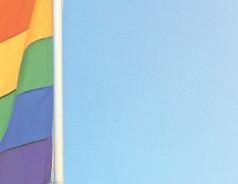

Contact :www.PeakPride.org
Religious leaders and others among the crowd outside the Arizona Senate in Phoenix on Feb. 9, 2022 listen to Bridget Sharpe, state director of the Human Rights Campaign.
Bills a ecting transgender youth wind through Arizona Legislature
ERYKA FORQUER
Cronkite
News
After an unprecedented number of bills targeting transgender youth became law across the country last year, advocates in Arizona are pushing back against a new wave of bills introduced in this session.
Arizona lawmakers have proposed bills that prohibit transgender youth from recieving gender-a rming health care and limit their ability to express their gender identity in school bathrooms, school classrooms and school sports. The Human Rights Campaign and the Equality Federation, which are national LGBTQ advocacy organizations, warned that the measures would put the well-being of transgender youth at risk.
The following was added in order to update after the initial story was published.


[On March, 24, the Arizona House passed Senate Bill 1138, which bans some types of medical care for transgender youth, and Senate Bill 1165, which prevents transgender students from participating in school sports. The bills went to Gov. Doug Ducey’s desk for signature or veto. He signed them into law on March 30, a day before the International Trans Day of Visibility.]
“Transgender students don’t want or need to have a culture war built on their backs for the political expediecy of adults; they simply want to be kids,” the two organizations said in their combined annual state comprehensive report, released this year.

That’s why Jennifer Brown, a Scottsdale mother of a transgender daughter, is opposing Senate Bill 1165, which would prevent transgender girls in grades K-12 from playing on girls sports teams.
“These are just kids, and they just want to play” sports, Brown said. “This isn’t about
scholarships, this isn’t about big money. This is about kids trying to be part of a team and trying to be as normal as humanly possible.”
For transgender youth, sports teams often provide a source of normalcy during a time when they are transitioning, Brown said. It’s where their friends and teammates are, and for many LGBTQ youth, sports are an outlet that supports their mental health.
A 2021 national survey by the Trevor Project, a nonprofit organization focused on suicide prevention for LGBTQ youth, found that 42% of people ages 13 to 24 who identify as LGBTQ considered suicide in the previous year. The rate increased to 52% for transgender and nonbinary youth.
“There are real consequences to the discrimination perpetrated upon LGBTQ+ people, and particularly transgender youth,” Bridget Sharpe, the Arizona state director of the Human Rights Campaign, said during a virtual event this month with parents of transgender youth in Arizona, noting that “55% of LGBTQ+ Arizonans have reported that they’ve su ered from depression in just the past two weeks alone.”
The Williams Institute at UCLA, which conducts research on sexual orientation and gender identity, estimated in September 2020 that 3,650 youth ages 13 to 17 identified as transgender in Arizona. A 2017 report by the Centers for Disease Control and Prevention estimated that almost 2% of high school students identify as transgender and 35% of transgender students attempt suicide.
“Trans folks need to be believed and they need to be seen and heard,” Brown said. “You have to take it for what they are, for what they tell you they are. So if a trans girl says she’s a trans girl, then she’s a girl.”
Congregation Lev Shalom
All are welcome: Interfaith couples, individuals, families, seniors, the LGBTQ community, single parent families, Jews-by-choice, Empty Nesters, second-home owners… you.
Contact: (928) 527-8747
www.levshalomaz.org/
Liminal
Nonprofit café and community center. PWYC (pay what you can). Liminal o ers a safe space and free community resources including all-ages clothing, art supplies for adults and children, stationery items and working materials, harm reduction kits, radical books and zines, a community fridge and a public computer with free printing. The space also hosts workshops, performances, celebrations, community services and many kinds of art and culture gatherings.
Contact:
www.liminalflagsta .com
Beacon Unitarian Universalist Congregation





A welcoming congregation for everyone.
Contact:928-779-4492
www.BeaconUU.com
First Congregational Church Flagsta
FCCF is an Open and A rming church, which means LGBT people are welcome in its full life and ministry!

Contact: (928) 774-0890
www.FCCFlagsta .org
WHO TO CALL
REGIONAL RESOURCES
Navajo Nation Pride
The historic & largest Indigenous Pride celebration in the country. Honoring LGBTQIA+ relatives and rea rming the sacredness of their identities.
Contact:505-569-1516
www.navajonationpride.com
Arizona Trans Youth & Parents Organization (AZTYPO)
Arizona Trans Youth and Parent Organization is a support group to empower children, teens and their families in a supportive and inclusive environment in which gender may be freely expressed and respected. A family support group for families with gender diverse children. AZTYPO provides a supportive environment for children, adolescents, and their families to explore issues of gender identity.
Contact: contact@aztypo.org
www.aztypo.org/
Greater Yavapai County Coalition
A non-partisan organization
that provides an umbrella of support to members, family, friends and allies of the LGBTQ+ community by referring to a range of inclusive services, support, activities, and community connections.
Contact:303 E. Gurley St., #441, Prescott, AZ 928-583-3514 www.az-gycc.org
NAZGEM
Looking for Transgender support? NAZGEM is Northern Arizona’s Gender Mentors Network. NAZGEM hosts free monthly support meetings every fourth Friday at 7 p.m. and shares resources, support and information all month long!
Contact: 216 E. Gurley St. Prescott, AZ 86301 gyccinfo@gmail.com
Northland Cares
To improve the quality of life of those infected by HIV/AIDS in Northern Arizona.

Contact: www.NorthlandCares.org
Sedona Pride
At Sedona Pride, we support our LGBTQ community one person at a time.
Contact: 480-712-8005 www.SedonaPride.org
Granite Peak Unitarian Universalist Congregation Rev. Patty Willis, Minister (and Wedding O ciant). Where all are welcomed, encouraged and nurtured… a welcoming congregation and event site.
National Suicide Prevention Hotline: 1-800-273-TALK (8253). Veterans press 1.
Text TALK to 741741. Text with a trained counselor from the crisis text line for free 24/7.
The Trevor Project, Trevor lifeline available 24/7. 1-866-488-7386.
Trans Lifeline. Support for transgender people by transgender people. 1-877-565-8860.
SAGE LGBT Elder Care Hotline. Peer support and local resources for older adults. 1-888-843-LGBT (5428).
The LGBT National Hotline. Peer support and local resources for all ages. 1-888-843-4564.

PRIDE 2022 7
GENESIS ALVARADO, CRONKITE NEWS

8 | Sunday, June 5, 2022 Special Section 1




















































































 Svea Conrad, Niche Editor
Svea Conrad, Niche Editor


























